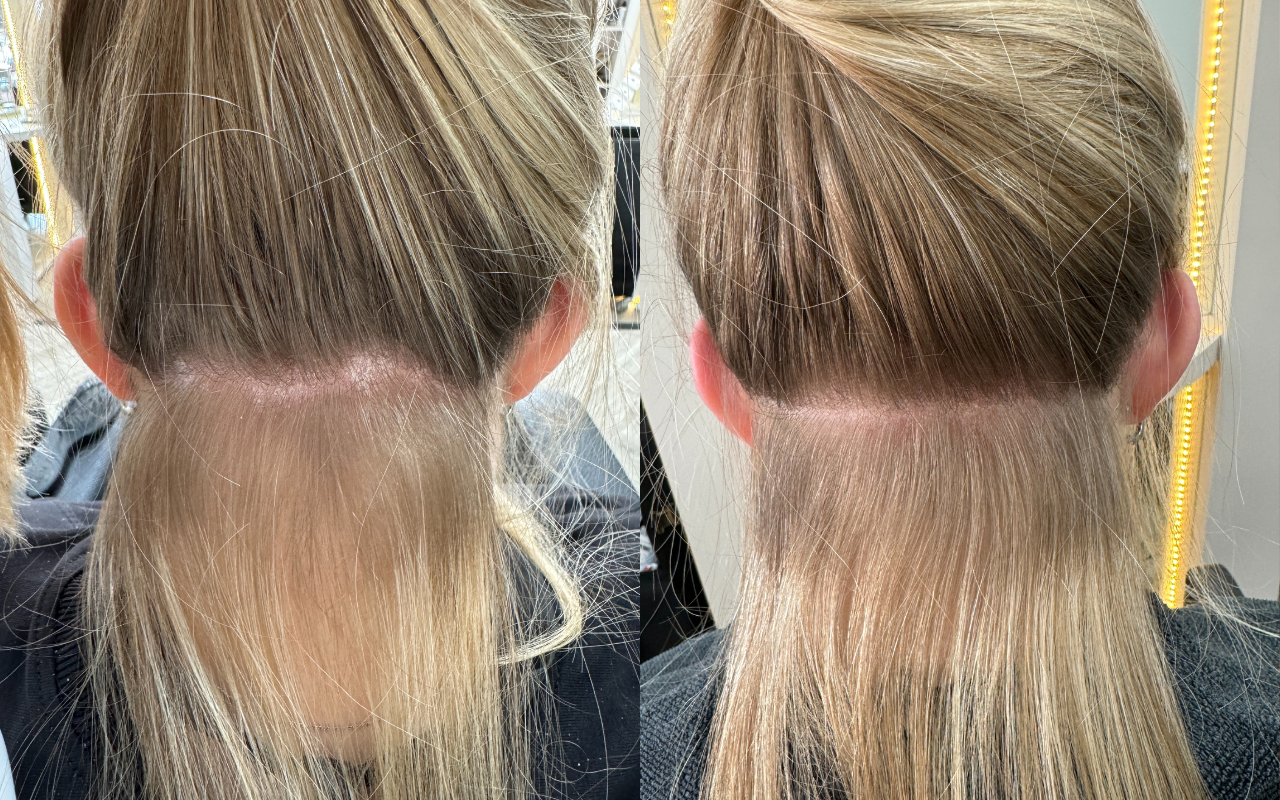What is the Thyroid and why is it important for hair health?
It's crucial to understand the connection between thyroid function and hair health for addressing and managing hair thinning and loss effectively. This is because the Thyroid, a small gland located at the front of your neck, plays a significant role in regulating numerous metabolic processes, including hair growth.
Thyroid Disorders and Hair Loss
Thyroid disorders such as hypothyroidism (under-active thyroid) and hyperthyroidism (overactive thyroid) can lead to hair thinning and loss. The hair growth cycle depends on proper thyroid function to regulate the rate at which hair cells grow and die. When thyroid hormone levels are imbalanced, it can result in a disruption to the hair growth cycle, leading to noticeable hair loss.
Hypothyroidism often causes dry, brittle hair that breaks easily, while hyperthyroidism can result in soft, fine hair with excessive shedding.
Other than hair thinning/loss, what other symptoms suggest a thyroid disorder?
hypothyroidism (under-active thyroid)
Common symptoms can present as:
hyperthyroidism (overactive thyroid)
Common symptoms can present as:
Diet and Lifestyle Impact on Thyroid Health
Your diet and lifestyle play a pivotal role in maintaining thyroid health. Nutrients like iodine, selenium, and zinc are vital for thyroid function:
- Iodine is crucial for the production of thyroid hormones. A diet low in iodine can lead to hypothyroidism.
- Selenium helps activate thyroid hormones so they can be used by the body.
- Zinc also aids in the hormone production process of the thyroid gland.
Lifestyle factors such as stress and physical activity also impact thyroid function. Chronic stress can suppress thyroid activity, while regular exercise can help maintain a healthy metabolism and improve overall thyroid function.
Does Tender Love and Hair support Thyroid health?
Tender Love and Hair supplements support thyroid health and consequently, optimal hair growth through a carefully selected blend of nutrients. Here’s how specific ingredients contribute:
-
Iodine (from Seaweed Extract): Essential for thyroid hormone production. Adequate iodine intake supports normal thyroid function, which regulates metabolism and promotes hair follicle growth and development.
-
Selenium (from Selenium Methionine): Plays a critical role in the conversion of thyroid hormones from their inactive form (T4) to their active form (T3). Selenium also protects the thyroid gland from oxidative stress.
-
Zinc (from Zinc Citrate): Essential for thyroid hormone synthesis. Zinc deficiency can lead to altered thyroid hormone levels, affecting hair growth.
-
Vitamin A: Involved in thyroid hormone metabolism. It aids in the regulation of the thyroid gland and is vital for hair follicle cycling.
-
Vitamin D3 (Vegan source): Helps regulate thyroid function and immune responses. Low levels of Vitamin D are linked to an increased risk of thyroid disorders.
-
B-Vitamins (such as B1, B2, B6, and B12): These vitamins are crucial for energy production and efficient metabolism, which are influenced by thyroid function. They also support hair health by aiding in red blood cell growth, which delivers oxygen to the scalp and hair follicles.
Other than diet, what are the other common causes for Thyroid disorders?
Thyroid disorders can stem from a variety of factors, each influencing the gland in different ways. Common causes include:
-
Autoimmune Diseases: Such as Hashimoto's thyroiditis (leading to hypothyroidism) and Graves' disease (causing hyperthyroidism), where the immune system mistakenly attacks the thyroid gland.
-
Iodine Imbalance: Both too much and too little iodine in the diet can disrupt thyroid function, as iodine is crucial for the production of thyroid hormones.
-
Genetics: A family history of thyroid problems increases the likelihood of developing a thyroid disorder.
-
Radiation Exposure: Exposure to radiation, particularly in the neck area, can harm the thyroid gland.
-
Pregnancy: Some women develop thyroid issues during or after pregnancy due to hormonal fluctuations and immune system changes.
-
Pituitary Disorders: Since the pituitary gland regulates thyroid hormone production, any disorder in the pituitary gland can indirectly affect thyroid function.
-
Medications: Certain medications can have side effects that alter thyroid hormone production.
Medications for Thyroid Conditions and Their Side Effects
Common medications for thyroid issues include Levothyroxine for hypothyroidism and Methimazole for hyperthyroidism. While these medications are effective in managing thyroid levels, they can have side effects, including fluctuations in hair texture and density. It’s essential to monitor these changes and consult with your healthcare provider to adjust treatment plans as necessary.
Polycystic Ovary Syndrome (PCOS) and Hair Loss
PCOS is a hormonal disorder that often co-exists with thyroid issues and can also lead to hair thinning due to elevated androgen levels, such as testosterone. These hormones can shorten the hair growth phase and extend the resting phase, resulting in significant hair loss known as androgenic alopecia.
Women with PCOS may experience hair thinning primarily on the scalp, while observing more hair growth on the face or body.
Improving Thyroid and Hair Health
To support thyroid health and, by extension, your hair, consider these steps:
- Adopt a balanced diet rich in antioxidants, vitamins, and minerals that support thyroid function.
- Manage stress through practices like yoga, meditation, or mindfulness.
- Monitor hormone levels regularly, especially if you have or are at risk for thyroid issues.
- Consult with a healthcare provider before starting any new treatment or supplement, particularly if you have underlying health conditions like thyroid disorders or PCOS.
- Care for your hair and scalp by using a holistic hair growth protocol such as The Inside Out Method™ in order to create the optimal environment for healthy hair growth. This method focuses on both internal nutrition alongside topical scalp and hair treatments such as our award-winning En-Root Scalp OIl, for promoting strong, healthy hair.
Conclusion
Along with a whole host of bodily functions including metabolism, bone health and immune function,Thyroid health directly influences hair growth and quality. By understanding the interplay between thyroid function, lifestyle choices, and hormonal disorders like PCOS, you can take proactive steps to maintain a healthy thyroid health for hair vitality and overall well being.





